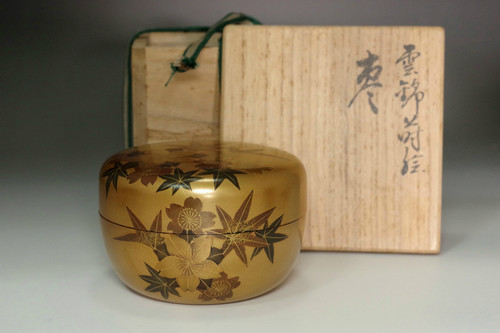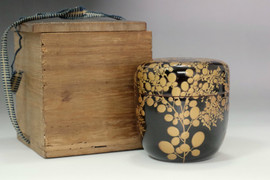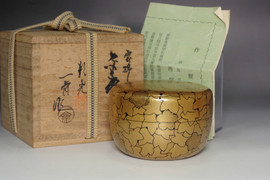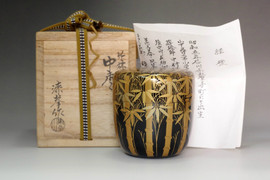NATSUME Japanese gold lacquered tea caddy #5135
- SKU:
- 5135
- Shipping:
- Free Shipping
Width (Diameter): approx. 8 cm (3 5⁄32 in)
Height: approx. 5.5 cm (2 5⁄32 in)
Weight: 60g (w/ box 192g)
Artist: Kuze soshun (b.1950)
Natsume is a traditional tea caddy made from high-grade wood and decorated with a gold lacquer called Makie. Its name comes from its shape, which is like a jujube (natsume in Japanese). Before the famous artist Sen no Rikyu (1522-1591) used natsume tea caddies in his tea ceremonies, pottery tea caddies were the norm. Natsume was used for daily necessities as pill case or something for townsman. Natsume remains popular with Tea Ceremony masters to the present day.
Originally, usucha (weak green tea) was called "packed tea" because it was a low-quality tea that was used to fill in the space around bagged koicha (strong green tea) when it was placed in a tea earn. For that reason, from the time of Takeno Joo to the time of Sen no Rikyu, "tea" only referred to koicha. Because usucha was looked down upon, its container was a wooden box called a hikiya, the purpose of which was to store the chaire, koicha tea caddy. In other words, the case originally used for the chaire, koicha tea caddy, was put to another use, eventually being used independently as a usucha tea caddy. Technically, the hikiya for tea containers like nasu (an eggplant-shaped tea caddy) and bunrin (an apple-shaped tea caddy) is called a natsume and the hikiya for katatsuki (a container with protruding parts at the top) is called a nakatsugi, but generally, it is common to refer to both kinds of hikiya as natsume. They are broadly classified as large natsume, medium natsume, and small natsume, and each of these categories is further divided into large, medium, and small.

















